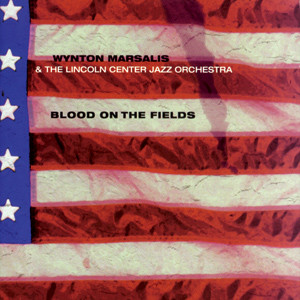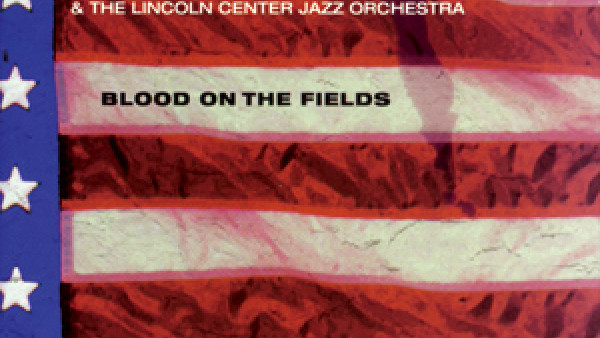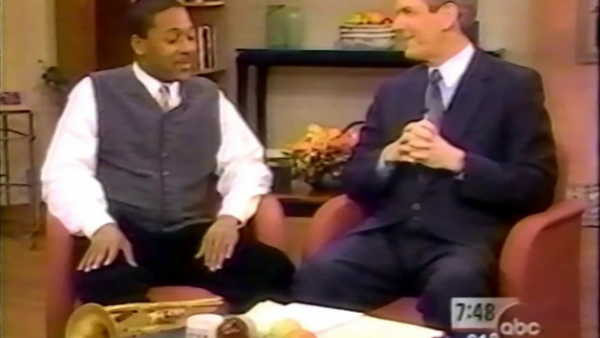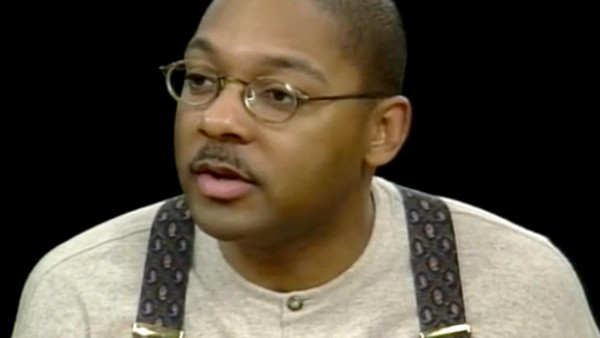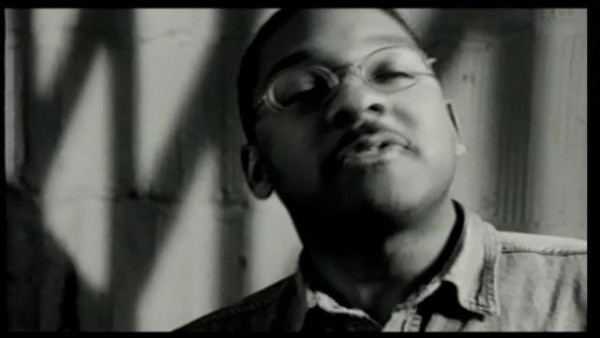A Conversation with Wynton Marsalis
At 35, Wynton Marsalis already has more accomplishments behind him than most musicians do in a lifetime. Since he first began recording with his own band in 1982, the New Orleans-born trumpeter has put out some 30 albums, won Grammy Awards in both the classical and jazz fields, [and has] performed in countless clubs and concert halls around the world. A passionate teacher as well as a performer, Marsalis has preached his musical message to thousands of young people via master classes, seminars, radio and TV shows. As Artistic Director of Jazz at Lincoln Center since 1987, he has helped bring jazz into the cultural mainstream and burnished its respectability as America’s only native art form.
A less ambitious artist might be content to rest on his laurels. But Marsalis is a driven young man, burning with new projects, dreaming of ever bigger horizons. “I’m trying to cover more ground,” he says. “Not just do the same thing, but be creative, use different techniques, capture more of the music.” That effort has led him to focus increasingly on composing over the past few years. Starting in 1992 with “In This House, On This Morning,” a multipart band piece based on the structure of a traditional church service, Marsalis has penned an impressive body of work, including “Citi Movement” and “Jazz: Six Syncopated Movements” for the New York City Ballet (1993); the string quartet “At the Octoroon Balls” (1995); and “Sweet Release”, a jazz ballet for the Alvin Ailey American Dance Theater (1996) and co-wrote the 26-hour “Making the Music” series for National Public Radio last year.
For good measure, Marsalis teamed up with photographer Frank Stewart to produce “Sweet Swing Blues On the Road”, an anecdotal book on his life as a touring bandleader, – a life that appears to be over, at least for now, since he recently disbanded his septet in order to concentrate on his other projects.
If the critics are to be believed, Marsalis’ towering achievement so far is “Blood On the Fields,” the epic jazz oratorio that he premiered with the Lincoln Center Jazz Orchestra in April 1994 to widespread public acclaim. With a CD version Marsalis and the LCJO will perform the massive, three hour work in 15 U.S. cities before embarking on a two-week European tour in March. Combining elements of traditional and contemporary jazz, blues, ragtime, spirituals and American popular songs, “Blood On the Fields” depicts the encounter of African slaves (played by vocalists Cassandra Wilson, Jon Hendricks and Miles Griffith) with their new American homeland. The tour will likely constitute a landmark in Marsalis’ career and, quite possibly, in the history of late 20th-centurv American music as well.
Thomas Sancton: What’s a typical work-day like for Wynton Marsalis? When do you find the time to compose?
Wynton Marsalis: Usually late and in a hurry (laughs)
TS: Late at night?
WM: Late for the commission. It can be night, morning, anytime. I like being under the pressure of being late. For some pieces, I would have thought about them a long time ago. Like “Blood on the Fields,” I thought about it in 1986 or 1987, though I didn’t write it until much later.
TS: Tell me more about “Blood On the Fields.” What’s it about?
WM: It’s set in slavery times, but it’s not about slaves really. It’s about today. The only part that’s about slavery is the beginning part, which takes place on the slave ship. I use all different kinds of music. The basis of it is blues, and also spirituals, which is before the blues. I have things that come out of choral writings, chants, contrapuntal textures. New Orleans-type things, modal progressions, things with chord changes like the standard popular songs, ballads. I have a band set up like a Greek chorus.
TS: You mean the band speaks?
WM: Yeah, the band speaks. Kind of like a congregation commenting on the action. I try to have some pieces where you go through different moods. Like in the beginning when Cassandra [Wilson] is supposed to sound like she’s losing her mimd. It has lots of different things, like shouts and sounds going back to spasm bands. A lot of the stuff is real contemporary.
TS: Is it jazz?
WM: It’s coming from the perspective of jazz. But it’s not something in the contemporary sense of trying to combine all these things into fusion and some new thing. You know, I never really try to do that. It’s new because it’s never been played this way. With something like this, from the very first piece it’s so wild. There’s all kinds of sounds, different types of polyphonic things. Five saxophones playing five totally different lines.
TS: Ellington used to leave a lot of leeway for his soloists, sometimes just blocking out the chords. Did you do that in this piece?
WM: In this piece, yes. As the piece progresses, as the characters become freer there is more room for people to play. In the beginning a lot of it is all written out.
TS: In what sense do the characters become freer?
WM: Well they start off in slavery—actually before slavery. Cassandra’s character [Leona] poses a question which is like today, contemporary life. When a woman says “Move over,” she doesn’t mean move over, she means come closer. You see what I mean? So automatically, you’re starting off with this thing that is like a lot of contemporary relationships. Its told from an African-American perspective, but really it’s the American perspective. That’s the basis of a lot of our problems: you’re hearing one thing, but what’s actually being said is another thing.
TS: What is Cassandra hearing?
WM: She’s on the slave ship and she thinks she hears a drum. But it’s a different drum than a traditional drum. She thinks she hears a drum coming from way back; it’s like an ancestral thing. Then the man comes in and she starts to go crazy. She’s calling for her mother—she’s in a slave ship, man, her hair is stinky and she’s never been on water, she thinks monsters are going to eat her, it’s beyond her wildest imagination.
TS: The man who appears, this is the African prince [Miles Griffith]?
WM: Yeah. This piece is about this man identifying himself, and about what it takes for him to learn what soul is. He believes he is one thing, but he really is not. He’s confused in his identity. And that’s about today.
TS: How does “Blood” compare to another long composition of yours, “In This House, On This Morning?”
WM: “In This House” is totally different. The whole form and the concept is different. That’s a church service. The method that I used for composition was very different. “Blood On the Fields” is for a larger ensemble, and the relationships are very complex. But I did learn a lot from “In This House” about integrating form. You know the last section of “In This House” is very flat—maybe too flat. But I had to create this effect of how a church service flattens out. You know, you’re always waiting for it to end. I was trying to create that with a lot of vamps and drones. In “Blood On the Fields,” I have a lot more chord changes, there’s a lot more activity. But it’s a totally different piece.
TS: Was “In This House” like a stepping stone? Could you have done “Blood” if you hadn’t had that earlier experience?
WM: Probably not, but I never know. Each one I just learn more from.
TS: You’ve done more and more composing in the last few years. What is the relationship between composing and your career as a performing artist?
WM: Composing comes out of the playing. Because when you play, you hear a lot of different things. If you play trumpet, it all just comes out of the trumpet. It depends on what someone’s hearing, you know? Ornette Coleman once came around my house and told me he could hear a lot of different connotations in my playing. It surprised me. Because he’s not given to just praising, he’s not that type of man. He said it was like language.
TS: So the composing just comes naturally out of expressing yourself on the horn?
WM: Yeah. After playing, I’ll hear something. They say that Duke used to compose after a gig, when I guess he could still hear all of the music. Monk would sit down and play for a long time then he would compose.
TS: IS that how you do it?
WM: I just try to hear, you know, get some type of form and just fill the form in. Everything starts from the form for me.
TS: When you say form, what are you talking about exactly?
WM: Things like the keys I want to go in, who I want to play what part, like a grid. If it’s a real big piece you have to have that or else it can just meander. A lot of times I write pieces that are real long, but I am very meticulous with the form. I want to make sure that it’s unified and integrated. Sometimes I use the melody notes as the basis of the progression. If I have something with different movements in it, I get a key scheme that goes across all of the movements. Maybe I get the key scheme from the notes in the melody. I just try to make sure that I have something coherent. The progressions and the melodies just come to me, I just hear them.
TS: Has the experience of composing and directing affected the way you play jazz on the stage?
WM: In a way. But what affected me more is that my band broke up.
TS: Why was that?
WM: We were on the road for a very long time and everybody was tired. Cats left for different reasons. [Pianist] Marcus Roberts left first. After that, [tenor sax player] Todd Williams left. Then [bassist] Reginald Veal was ready to take off. Then after him [drummer] Herlin Riley was ready to go because his kids were complaining that he wasn’t around. For seven years we were on the road all the time. It just became hard to keep it together. I am tired, the other cats in the band are real tired.
TS: How do you feel about that?
WM: Well, I like it. I have had a band since I was 20. Now I can take the time to hear more of what other musicians are doing. Also I work mainly at Lincoln Center now. That was a big thing for me, too, that we became a constituent of Lincoln Center. It’s just good to see the work that everybody’s doing is paying off. It’s not just me, you know, so many people work at Lincoln Center. Gordon Davis, the chairman of the board, Martt Leventhal, the president of Lincoln Center, Rob Gibson, Beverly Sills. Everybody came together to make this a reality.
TS: Tell me more about Jazz at Lincoln Center. What are you trying to do there, what do you think you’ve accomplished?
WM: We’ve already accomplished a lot in terms of just presenting the music. Joining in the dialogue about it, and increasing the awareness of the beauty of this music—the soul of it. We try to present our things with some soul, we say come and have a good time and swing. But unapologetically. We’re not apologizing for swinging. There’s lots of times it’s like, by being creative, you have to apologize for playing jazz music. Like you’re committing a crime or something to say “I’m a jazz musician.” But we have tremendous public support.
TS: How do you answer critics who say, for example, that you don’t use enough white musicians, that you run Jazz at Lincoln Center program on the basis of cronyism, and so forth?
WM: I feel that it is just part of the history of our nation. If you go back in the history of jazz, you’ll see that kind of thing many times. It’s a response to the perception of me using power the way that I want to use it as artistic director of Jazz at Lincoln Center, to present my vision of it, which is what I am hired to do. And that’s something that makes a lot of critics uncomfortable—much more than they would be in another field. You can be sure that other artistic directors don’t have to put up with that.
But I thank the Lord for the opportunity to be attacked. You know what I’m saying? I thought the attack that my critics mounted was pitiful. It was poorly researched, it wasn’t based on facts. It was really just emotion. Fear. Anger. Ignorance. It hasn’t changed how I do my job. I am ready to confront them at any time. I was hired to do a job and I am going to do it. You know I’m from another era. A lot of the time, with
jazz, they’re used to dealing with a different kind of political era where black musicians had to bow down to them—not exactly bow down, but you know what I’m saying. So they’re thinking that I would do the same thing. But I won’t.
TS: Does that kind of controversy drag you down as an artist?
WM: By nature I’m a battler. I love to battle for the fun of it. A lot of times with the media, if you have a strong opinion, they try to present you as rigid. But I don’t mind somebody who thinks something different. I actually enjoy a good argument.
TS: You don’t think you have rigid opinions?
WM· Not at all. I have what I believe, and I will present it. But my opinions have changed a lot as I’ve grown older—and they will continue to change. On any given subject my views have changed drastically.
TS: When you were younger, you expressed scorn for traditional New Orleans jazz, then at some point you discovered Louis Armstrong and King Oliver. Is that a good example?
WM: That was a big change. And I’ll say it. And since then, I have gotten deeper and deeper into that music.
TS: In what ways have you not changed your opinions?
WM: I still haven’t accepted the whole rock and roll revolution. Nothing indicates to me that it should be celebrated.
TS: But isn’t that a losing battle?
WM: That’s a lost battle, that’s not a losing battle. But just because something is lost, doesn’t mean you shouldn’t fight it. To me it’s like playing at the end of a game. You may be down by sixty points, you know you’re not going to win. But that doesn’t mean you gotta go to the bench. You still gotta play.
TS: But what future does jazz have up against something as powerful as the rock industry?
WM: Jazz is not up against rock and roll—our society is up against it. In the first place, there’s a lot of young musicians playing jazz. For every instrument, you can name a lot of musicians who are playing jazz.
TS: Do you think that more younger guys get into jazz since you started with Art Blakey in the early 80s?
WM: No doubt about that. There’s no comparison.
TS: Do you feel like you’ve had something to do with that?
WM: Me and all the musicians who_have played. It’s our playing, the fact that we were going around the country playing all the time. Me, Marcus Roberts, my brother Branford—all the musicians who are out there playing have an influence. Terrance Blanchard, Donald Harrison, Nicholas Payton, the list goes on and on.
TS: Now that your band has broken up, do you see your career moving in a more organizational or institutional direction? Where do you go from here?
WM: I am going back to playing and writing all the time. I just have to re-group and get my strength back together. There’s so much stuff happening.
TS: Do you miss the regular playing, the concerts, the jazz clubs?
WM: Yes, I miss just playing. I would play all night, you know. This year I’m going to get deeply back into the woodshed. I haven’t really had time to practice like I want. If you don’t practice it’s very hard to sustain yourself. I’m Just going through like a little period right now. I’ve had some days this year when I haven t played at all. I’ve gone one or two days at a time without practice. And that hadn’t happened in the previous twenty-something years.
TS: Do you notice a difference?
WM: Oh yeah. My lips start to feel funny. It’s not my fingers, but my lips and the breathing. Coordination, reflexes. You’ve got to keep those up.
TS: You spend a lot of time teaching younger musicians. How do you describe your teaching method?
WM: Well we just comes out of playing. To me, the source of all of your power is the creative playing and the art of music itself. With teaching, you communicate a lot more than just what you tell the students. And I always tell them, when I really criticize them, that I’m coming in the spirit of love. Because they have to know that you’re not there to put them down—that you’re there to impart some information and that it’s not biased. In the service and interest of music, it’s coming from a perspective of love and the desire to see them develop. You know, if you’ve taught a certain number of kids and you have the experience of doing it, you just develop a feeling for it. I learned a lot form my father [pianist and teacher Ellis Marsalis], watching him when I was growing up. You see, he was a good teacher. Him, Alvin Battiste, Kidd Jordan, Danny Barker. Now they all play very different styles of music, but their way of teaching is just down home.
TS: What do you mean by “down home?” Is [it] a personal way of communicating?
WM: You’ve got to just love the students and you have to want to communicate that. You also have to know that the communication and interpersonal stuff really comes from God. It’s a spiritual thing, really.
Teaching is a very spiritual thing. The whole crux of everything is the spirituality, and to me it just runs through this music. When we were doing “Making the Music,” that 26-hour series for National Public Radio, all of the musicians we interviewed said that: if you don’t have love in your music, you can’t be great.
TS: What makes you spend so much time teaching?
WM: I like doing it, man. I like to be around them and hear them play. I like to be around them. You just get the feeling from them—even when they’re hard-headed.
TS: Do you do it to pass the torch on?
WM: You can’t pass the torch on; somebody has to come up who wants to take it. It’s not up to you to do that. If somebody wants to pick up the torch of something it can be long-dead and they’ll pick it up. Picasso used to always say that he could make forms of art come alive that had been dead for a hundred centuries. And he could do that. Like Louis Armstrong—he could just raise sounds from the dead, sounds that hadn’t resonated for who knows how many years, and this trumpeter would resonate them. He wouldn’t even say that he was trying to do it. But he did it, you know. Things Just have a spiritual resonance to them. That’s what it’s all about.
by Thomas Sancton
Source: JazzTimes

